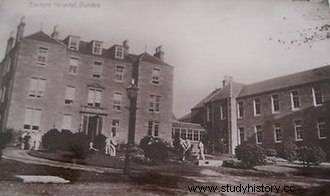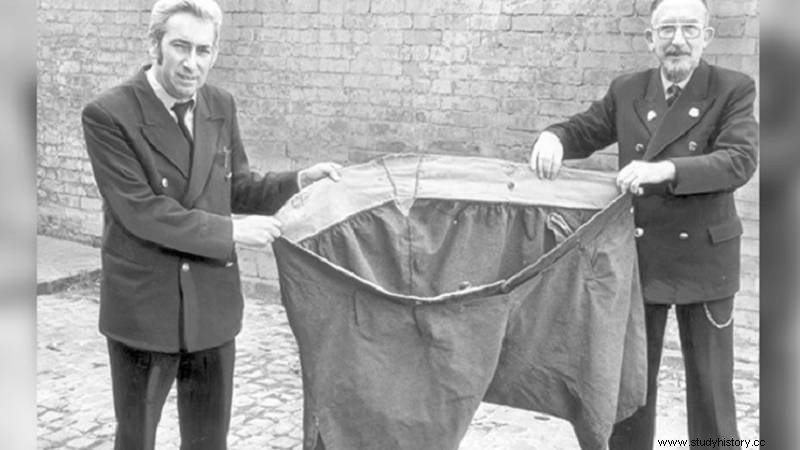In 1965, 27-year-old Angus Barbieri came to Maryfield Hospital in Dundee, Scotland. The man had been struggling with serious overweight for a long time, which he hoped would be helped by the doctors. He did not think that this visit would not only change his life, but would make him a legend, writing on the pages of the Guinness Book of Records in the category of ... the longest-fasted person in history.
Angus came from the Scottish town of Tayport, where he worked in the family business. His father ran a place selling the famous fish and chips. Easy access to fried and high-calorie food affected the boy's weight. At 27, he weighed 206 kilograms. He stopped feeling comfortable with his appearance. He was also worried about the possible health consequences of this situation, which is why he decided to lose unnecessary kilograms. However, he realized it would be difficult for him without medical intervention.
In 1965, Angus was admitted to Maryfiels Hospital in Dundee. During conversations with doctors, the topic of fasting emerged. It was not particularly recommended by medics because of the possible negative consequences for the human body. Nevertheless Angus liked the idea of fasting and after conducting preliminary research it was decided that the man could take up this task , but for no more than 40 days.
Breaking the boundaries
At first, Barbieri was under the constant care of the medical staff at the hospital. However, the days passed and his body reacted very well, so it was decided to send him home, where he was to continue the treatment. However, he did have to make regular check-ups.
When the 40 days had passed, Angus showed up for the visit that was supposed to be the last one. But the results he had achieved so far, and the fact that he had been feeling very well all this time, motivated him to continue his fast. He set himself the goal of the final weight he wanted - 82 kilograms. Doctors advised him not to continue treatment Barbieri insisted however. He stated that, with or without them, he would continue to fast until he reached his destination.
There was an agreement. The man continued to have regular check-ups. If, during the fast, he suddenly felt unwell or his results were not satisfactory, the experiment would be stopped immediately. Thus began the longest post in history.

In 1965, Angus was admitted to Maryfiels Hospital in Dundee.
But did Angus really eat anything during his lifetime? The answer is of course not. Without normal food, Barbieri deprived his body of the vital nutrients it needed to function properly. To avoid this situation, doctors supplemented with potassium, sodium and vitamins. Angus also drank a lot of low-calorie drinks - such as coffee, tea and mineral water. At the end of the treatment, he supplemented them with a little sugar and milk.
Medical anomaly
The Scot turned out to be a medical anomaly. Throughout the fast, he experienced almost no health problems. His body adapted very well to the new conditions. It didn't mean, however, that he was okay with nothing. Barbieri was consistently low in glucose. This result was a clear confirmation that his body was in a state of starvation. For this reason Angus felt general weakness. However, it was the only ailment he had.
The fact that Angus spent his hunger strike at home proves his high determination and self-denial. Most of the patients in a similar situation chose to remain in the hospital for the duration of their treatment, where they did not have easy access to regular food. But Barbieri's obstinacy had its limits as well. To achieve his goal, he decided to quit his job in his father's eatery.
The longest post in history ended after 382 days, on July 11, 1966. During this period, the man lost 125 kilograms, reaching his intended weight. Of course, due to intense fasting, he could not immediately allow himself to return to a normal diet. His first meal was a breakfast consisting of one egg, a slice of buttered bread, and coffee. Over time, he returned to normal dishes and standard portions, but was never affected by the yo-yo effect. Five years after treatment, studies showed that he kept a stable weight of 88 kilograms.
In 2012, the Australian doctor Karl Kruszelnicki, after a closer analysis of Angus's case, stated that his body reacted to the fast in an ideal manner. He started taking fat stores and converting them into glucose. Theoretically, the human body should be able to function thanks to this reserve until it is exhausted. It is only after this period that fasting becomes dangerous for the body, as the digestion of the muscles begins. But while fat is able to keep the body working, it does not guarantee healthy functioning. Hence, in Barbieri's post, supplementation was so important. Nevertheless, his case remained and remains unique.

The longest post in history ended after 382 days, on July 11, 1966. During his lifetime, the man lost 125 kilograms to his intended weight.
We inherited the ability to survive hunger from our ancestors, who did not have constant access to food and were often forced to starve at longer or shorter intervals. Therefore, their organisms quieted down during the fasting period, slowing down their work. At that time, the brain was mainly very active, which stimulated thinking in order to obtain food. This state of affairs, however, could not last too long. To date, there is no medical evidence of the usefulness of fasting for more than 40 days. On the contrary - many researchers and doctors consider long fasting harmful.
The case of Angus Barbieri is treated as a curiosity rather than evidence of the effectiveness of this type of therapy. Doctors are still impressed by his stubbornness and the body's reaction to this day. With his result of 1 year and 17 days of fasting, the Scot entered the Guinness Book of Records, but it was quickly decided to close this category so as not to encourage other people to follow such a radical diet that could endanger their life and health on the way to beating the result.
